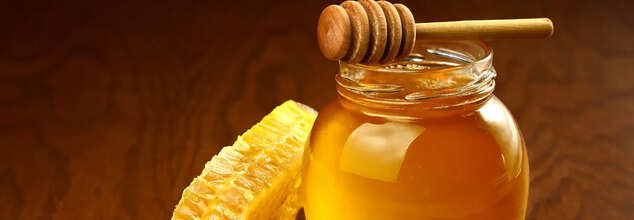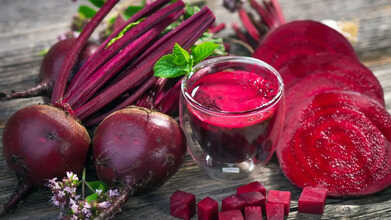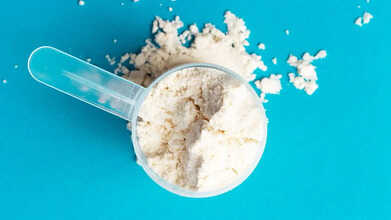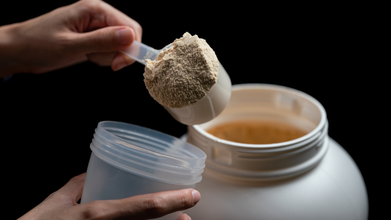- Health Conditions A-Z
- Health & Wellness
- Nutrition
- Fitness
- Health News
- Ayurveda
- Videos
- Medicine A-Z
- Parenting
- Web Stories
Honey Has No Expiry Date: Here's Why You Should Switch To This Natural Sweetener

Credit: Canva
Honey is a naturally sweet, syrup-like substance that bees produce from the nectar of flowering plants. The bees collect the nectar and then consume, digest, and regurgitate it inside the beehive to produce honey. This honey is stored in wax structures called honeycombs, which are gathered by humans through the practice of beekeeping. It is highly cherished for its nutritional value and sweet taste. But there is a very interesting fact about this natural sweetener that can leave you flabbergasted. It is the fact that honey never spoils, even after 3000 years.
Why Is There No Expiry Date On Honey?
Honey lasts forever it never spoils, even after 3000 years. In fact, archaeologists found honey thousands of years old in ancient Egyptian tombs, and it was still good! While most of us don't need to worry about honey that old, their discovery proves that if properly contained, real honey can last for a very, very long time. The reason behind this is the magical longevity of honey, as well as the bees' honey-making process. Organisms that spoil food do not survive in honey. While honey does not expire, it does change its texture, darken and lose its aroma and flavour or crystallize, depending on the change in temperature. Only natural, real honey undergoes these normal changes and can last for thousands of years. Processed or altered honey doesn’t preserve the natural benefits of honey.
Why Should You Consume Honey?
High in Antioxidants
High-quality honey is rich in several important antioxidants- such as phenolic acids and flavonoids. Antioxidants are compounds that help fight disease-causing free radicals, thereby reducing your risk of oxidative cell damage. Research has shown that a diet which is high in antioxidants could help an individual prevent chronic diseases as well as mental health issues.
May Improve Heart Health
Swapping out regular sugar for high-quality honey in your diet may improve different aspects of heart health. Numerous studies have shown that it reduces several risk factors for heart disease.
For example, one 30-day study comparing the effects of table sugar and honey in 55 people found that honey helped decrease levels of total and “bad” LDL cholesterol while increasing “good” HDL cholesterol. It was also able to lower triglyceride levels by up to 19%.
Promotes Wound Healing
In some forms of traditional medicine, such as Ayurveda, honey is applied directly to the skin to aid wound healing. This is thought to be due to its antibacterial properties and its ability to decrease the growth of microorganisms that could cause infection.
In one small study, applying manuka honey directly to diabetic foot ulcers was as effective as conventional wound dressings and promoted healing in 97% of ulcers. Similarly, another study of 30 people showed that adding honey to wound dressings enhanced healing in about 43% of diabetic foot ulcers after three months.
Better Than Refined Sugar
While honey is high in sugar, it is still a better choice than refined sugar. Processed sugar brings little to the table, while honey is high in antioxidants, including phenolic acids and flavonoids. One study also suggests that using honey instead of table sugar may decrease triglycerides as well as total and "bad" LDL cholesterol to support your heart health. However, while honey may be a better option than refined sugar, it should still be consumed in moderation to prevent adverse effects on your health.
THIS Common Vegetable Juice Can Help Lower Your Blood Pressure Naturally

Credits: Canva
A common vegetable has been found to help reduce blood pressure in older adults, according to a new study. Beetroot juice can lower blood pressure in people aged 60 and above by targeting certain potentially harmful bacteria in the mouth. Researchers at the University of Exeter studied how younger and older adults responded to beetroot juice, which is rich in dietary nitrates. These nitrates are converted by the body into nitric oxide, a compound that relaxes and widens blood vessels, helping to lower blood pressure.
How the Study Tested Beetroot Juice on Younger and Older Adults
The study included 39 adults under the age of 30 and 36 adults in their 60s and 70s. For two weeks, each group received shots of beetroot juice. After a two-week break, during which participants used antiseptic mouthwash daily, they were given a placebo juice without nitrates for another two weeks.
Researchers analyzed the bacteria in participants’ mouths using gene sequencing. In both groups, the oral microbiome—the community of microorganisms in the mouth—changed after drinking nitrate-rich juice, though the effects were different depending on age. In older adults, there was a reduction in common bacteria that can sometimes cause infections and an increase in bacteria that support health. The older participants also showed lower blood pressure after two weeks of drinking the nitrate-rich juice.
Professor Andy Jones of the University of Exeter said, “This study shows that nitrate-rich foods can change the oral microbiome in ways that may reduce inflammation and lower blood pressure in older adults. This opens the door for larger studies to examine how lifestyle factors and biological sex affect responses to dietary nitrate supplements.”
Can A Person Drink Beet Juice While Taking Blood Pressure Medication?
It may be possible to drink beet juice while taking blood pressure medications. However, it’s important to consult a doctor before making any changes to a treatment plan for high blood pressure.
A doctor can advise whether combining beet juice with blood pressure medication could lower blood pressure too much. If this happens, a person may experience symptoms such as:
- Dizziness or lightheadedness
- Blurry vision
- Fainting
- Confusion
- Weakness or tiredness
- Headache
- Back or neck pain
- Heart palpitations
- Nausea
Low blood pressure (hypotension) can be serious. If someone experiences severe symptoms that do not improve when sitting or lying down, they should seek immediate medical attention.
Does Eating Beets Lower Blood Pressure?
Eating beets may help reduce blood pressure, but most research has focused on beet juice rather than whole beets.
Currently, there isn’t enough scientific evidence to confirm that eating beets has the same effect as drinking beet juice.
If someone wants to explore dietary changes to manage their blood pressure, it’s best to consult a doctor before making adjustments.
As Unsafe Levels of Lead Are Found in Protein Powders, Here Are Safer Alternatives You Can Switch To

Credits: Canva
Protein powder lead consumer reports: Some protein powders and shakes have been found to contain unsafe amounts of lead, according to a recent Consumer Reports investigation. The report, released Tuesday, analyzed 23 protein products, including dairy, beef, and plant-based supplements and revealed that over two-thirds contained more lead per serving than what experts consider safe, which is around 0.5 micrograms a day.
With growing concern over heavy metal contamination in protein powders, it’s worth exploring healthier, safer alternatives to meet your protein needs.
Protein Powders, Shakes Contain High Levels of Lead and Other Metals, Consumer Reports Finds
“Protein powders and shakes have become incredibly popular among people looking to add more protein to their diet,” said Brian Ronholm, director of food policy at Consumer Reports, in a news release. “Our tests found that toxic heavy metal contamination in protein supplements is widespread and has worsened since we first examined these products 15 years ago.”
According to the findings, plant-based protein powders had the highest levels of lead, averaging about nine times more than dairy-based options like whey and twice as much as beef-based products.
Among the products tested, Naked Nutrition’s Vegan Mass Gainer and Huel’s Black Edition were identified as containing the highest levels of lead and were listed under “products to avoid.” The full list of tested brands is available in the report.
Protein Powder Lead Consumer Reports: Alternatives To Protein Powder And Health Supplements
Andrew Mock, MD, MPH, a preventive and lifestyle medicine specialist at Loma Linda University Health and also California’s Strongest Man says the flood of protein products in the fitness market can often lead people to spend large sums on items that may not be beneficial, necessary, or even safe.
“For a non-active adult, about 0.8 grams of protein per kilogram of body weight is enough to prevent deficiency,” Mock explains. “For those who exercise regularly, the target should be 1.2 to 1.6 grams per kilogram daily. Higher amounts can be safe, but most people don’t actually need that much.”
Although protein shakes are convenient, nearly half of Americans (46%) drink them regularly Mock notes that they are not essential.
“You can easily meet your protein needs with regular food,” he says. “Protein powders and ready-to-drink shakes are helpful for busy days, but they shouldn’t be treated as dietary must-haves.”
Whole food protein sources include:
- Eggs
- Fish such as salmon, tuna, and cod
- Greek yogurt
- Cottage cheese
- Milk
- Beans like black, kidney, and lentils
- Chickpeas
- Tofu
- Quinoa
- Chia seeds
- Flaxseeds
- Nut butters such as peanut, almond, or cashew
When time allows, homemade protein shakes made with natural ingredients are another safe and nutritious choice.
What Safe Supplements Should You Take?
While supplement companies are required to register with the U.S. Food and Drug Administration (FDA), the agency doesn’t routinely test their products. This lack of regular oversight raises safety issues, including contamination.
“It’s surprisingly common for even well-known supplement brands to contain harmful ingredients,” Mock warns. “These can include heavy metals, anabolic steroids, or other banned substances. One study even found that one in eight supplements contained illicit materials.”
Contamination has been detected across various products, from protein powders and multivitamins to herbal capsules with some not even containing what their labels promise.
To reduce these risks, Mock advises checking packaging for third-party testing certifications, which confirm that a product meets strict safety standards.
“Look for labels such as the National Science Foundation (NSF) mark, or certifications like Informed for Sport and Certified for Sport,” he says. “Another key label is current Good Manufacturing Practice (cGMP), which means the supplement is produced under proper safety and hygiene conditions monitored by the FDA.”
These certifications offer a level of reassurance that a supplement has been independently tested and verified. By checking for them, consumers can make smarter and safer choices when buying protein powders or other health products.
High Levels Of Lead Found In Protein Powders And Shakes, Reveals Consumer Reports

Credits: Canva
Consumer Reports Protein Powder: The Consumer Reports Protein Powder Investigation, titled 'Protein Powders and Shakes Contain High Levels of Lead', revealed, as the name suggests that some of the most popular and widely known protein powder were found with leads and other metal contents. The report was published on Tuesday, which analyzed 23 protein powder and shakes. The range included dairy, beef and plant-based protein supplements. The analysis found that more than two-thirds of the products contained more lead in a single serving than what experts consider to be safe, around 0.5 micrograms per day.
Also Read: Is Huntington’s Disease Genetic? Here’s Everything You Should Know
Brian Ronholm, director of food policy at Consumer Reports in a news release said, "Protein powders and shakes have become immensely popular and are part of a daily routine for many people who are focused on consuming more protein in their diet. Protein powders and shakes have become immensely popular and are part of a daily routine for many people who are focused on consuming more protein in their diet."
Lead Levels, Which Protein Powder Has The Most?
On average, the lead levels in plant-based products were the highest. The report revealed that it was nine times the amount found in dairy-based proteins, like whey. When compared to beef-based products, the plant-based powders had twice as much lead in it.
The Consumer Reports also published a list of products to avoid, among them, at the top were two plant-based protein powders by the brand Naked Nutrition Vegan Mass Gainer and Huel Black Edition. The former one contained 1,572% more lead than the level approved, while the latter one contained 1,288% over the approved level. The Consumer Report suggested that these powders should not be consumed at all, while for other products, it did provide the servings per week limit.
The categories are:
- Products to Avoid
- Recommend Limiting to Once a Week
- Okay to Eat Occasionally
- Better Choices for Daily Consumption
The Consumer Reports provided that Muscle Tech Mass Gainer showed no lead in its product, thus no limit was placed on it.
Consumer Reports Protein Powder: How Was The Test Conducted?
The Consumer Reports in its report writes that they purchased multiple samples of each product, including two to four distinct lots, over a three-month period beginning last November. These products were brought anonymously from online retailers and food stores. The samples from multiple lot were tested for levels of protein, arsenic, cadmium, lead, and other elements. However the report notes: "the results are based on an average of these samples, which were collected over a specific period of time, they may not mirror current contaminant levels in every product. Even so, the findings highlight why consumers should carefully consider the role of protein powders and shakes in their diet."
How Did The Protein Powder Companies Respond?
7 of the 23 companies did not respond for comments, but those who responded said that lead is a naturally occurring element that is difficult to avoid, especially in plant-based products. Eight companies, namely: Equip Foods, Garden of Life, KOS, Momentous, Muscle Meds, Muscle Tech, Orgain, and Vega, said they test both their ingredients and finished products for heavy metals.
© 2024 Bennett, Coleman & Company Limited

